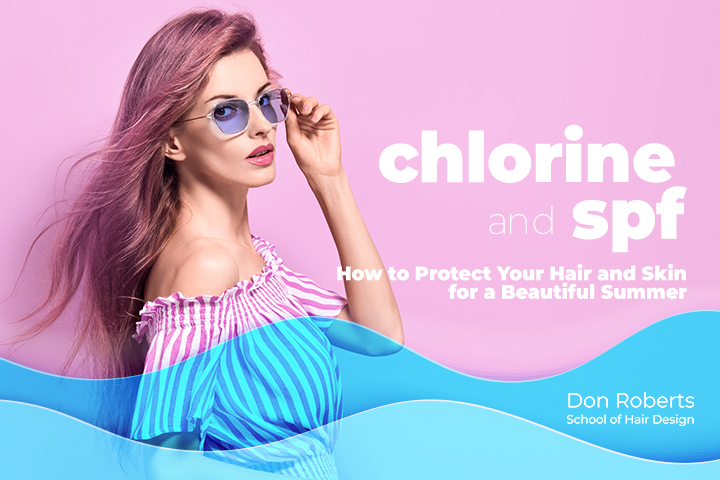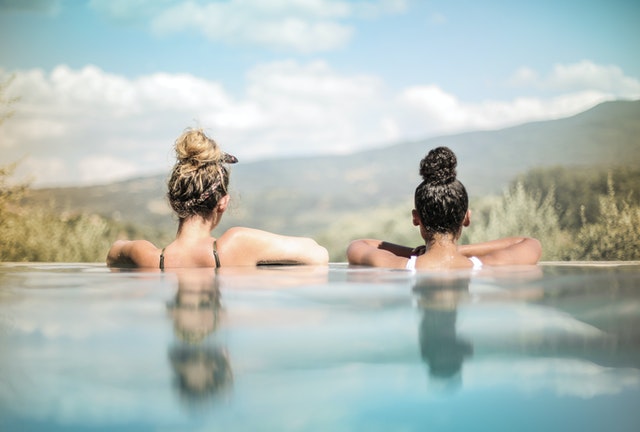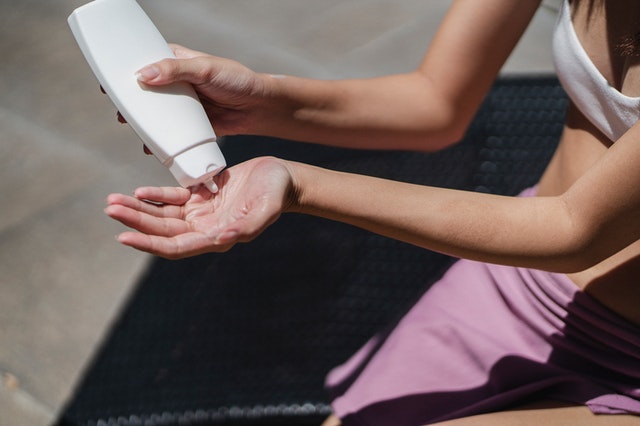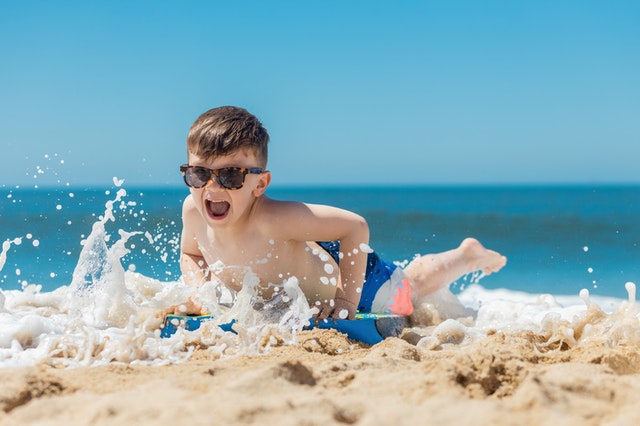July 9, 2021
Chlorine & SPF: How to Protect Your Hair and Skin for a Beautiful Summer

It’s summertime! We all know what that means. Putting on sunscreen to protect your beautiful skin and hanging out in the pool. While enjoying these carefree summer days, it’s important to know the facts about chlorine and SPF and how they can affect your skin and hair.
Chlorine is useful in keeping swimmers safe. It gets rid of unwanted bacteria, which keeps us safe from disease and infection. However, it is not the kindest to hair and skin. Sunscreen is essential for summer fun, but there are some misconceptions about SPF and how much SPF sunscreen should have. If you’re curious about what SPF you should be using and want to learn how to protect your hair from chlorine, keep reading! We’ll break down some ways to remedy the toll these items can have on your beauty routine.

Chlorine
Chlorine may get rid of bad bacteria in our pools, but it also takes the oil out of our hair and skin. This may not seem like a bad thing. Overly oily skin and hair are not fun. However, our hair and skin need that oil to be healthy. Without it, they become dry, rough, and damaged. Chlorine can also weaken your hair strands and cause split ends. It can also leave your skin irritated and red, especially if you have sensitive skin.
So what can you do to protect yourself and enjoy the pool? Here are some tips and tricks to help keep your skin and hair safe this pool season.
Ways to Prevent Chlorine Damage
While no method is perfect for preventing chlorine damage, there are many ways to reduce potential damage. See which ones could work best for you!
- Wear a swim cap and goggles
Wearing a cap and goggles while swimming may not be what we usually do. It can feel like a hassle and takes the spontaneity out of just jumping into a pool. However, they are great for protecting your hair and eyes from chlorine. They help prevent your hair and eyes from absorbing the chlorine, keeping them safe from damage and irritation. Make sure your cap and goggles are tight-fitting so water does not leak through. Silicone caps are great because they are lightweight and breathable. - Rinse your hair and skin before getting in the pool
Soak your hair and skin before you get in the pool. Your skin and hair are like sponges. They can only absorb so much water. If your skin and hair are saturated with clean tap water, they will be less likely to soak up the chlorinated water. - Put on a layer of protection
Have you ever noticed that oil and water don’t mix? They repel each other. That’s why it is a good idea to put some natural oil on your hair and skin before swan-diving into the pool. The chlorinated water will be repelled by the oil and is less likely to be absorbed. Some good oils to use are avocado, almond, jojoba, argan, and coconut. - Rinse and shampoo
It’s great to take precautions, but nothing is foolproof. There will always be some chlorine that sneaks through your defenses. A rinse after swimming is a good way to remove chlorine from your hair and skin. To help protect your hair, shampoo your hair after swimming. This will help remove a lot of the chlorine that could damage your hair.
Ways to Repair Chlorine Damage
Are you worried that your hair has already been damaged by chlorine? If your hair is dry, frizzy, bleached, and feels like straw, that is a sign it has some chlorine damage. However, this can be fixed with a little TLC.
- Check your scalp
A healthy scalp is important for healthy hair. Chlorine not only can damage hair, but it can also damage your scalp. If your scalp is dry, it has probably been damaged by chlorine. You can help reverse this by using moisturizing hair products that encourage your scalp to produce its natural oils. - Deep condition your hair
You may already have a conditioning routine for your hair. However, if you want to treat chlorine damage, you may need a weekly deep conditioning treatment. This can help seal in moisture and smooth frizz. Coconut oil is great to use for your deep conditioning treatment. - Clarify your hair
Sometimes chlorine can stay in our hair and make it feel unhealthy. A hair clarifier can remove any harsh chemicals from your hair. If you can’t buy a clarifying shampoo, you can also use an apple cider vinegar rinse to remove any unwanted chlorine. - Consult a hairstylist
If you’re worried about your hair being damaged, it’s a good idea to talk to a pro. A hairstylist can assess your hair and recommend products that can help. They can also trim any annoying split ends that were caused by chlorine. Getting an expert opinion can help alleviate some of your worries and help keep your hair healthy!

SPF: Myth VS Fact
Ah, sunscreen. The one thing children don’t want to put on, but as adults, they realize it is an essential part of their skincare routine. The big reason sunscreen is so important is because of its Sun Protection Factor (SPF). SPF is how we measure protection from the sun’s UVB rays.
While a sufficient amount of SPF is crucial, there are many misconceptions about SPF and what it can do. Let’s clear some of those up so your skin can be protected.
- Myth: A higher SPF means you can spend more time in the sun.
Fact: A high SPF does not protect your skin longer than a lower SPF. In fact, some people feel so safe with a higher SPF sunscreen, they stay out in the sun longer. This leads to sunburns and other skin damage. Reapply all sunscreen once every two hours or when you get wet. - Myth: You can’t go wrong with a high SPF.
Fact: You can go wrong with a higher SPF! A high SPF can have boosters that cover up damage from UV rays instead of protecting you from them. Plus, a high SPF can trigger allergic reactions and disrupt hormones. Moderate numbers are your friends when it comes to SPF. Experts recommend staying between 30 and 50 SPF. This will provide your skin with the protection it needs without giving you a false sense of security. - Myth: SPF prevents all damage from UV rays.
Fact: Your skin can still be damaged from UV rays even while wearing sunscreen. There are two types of UV rays: UVB and UVA. SPF offers protection from UVB rays. These rays are the ones that cause sunburns. However, sunscreen in the United States doesn’t protect from UVA rays because American sunscreens work with fewer and more outdated ingredients. These rays are from the sun’s radiation. They cause less obvious but very serious damage. Luckily, it’s easy enough to purchase a diverse range of sunscreens these days thanks to online retailers. Don’t let sunscreen be your only protection from the sun. Wear sunglasses and wide-brimmed hats. Stay in the shade whenever possible. - Myth: The SPF on the label is always accurate.
Fact: Unfortunately, this is not the case. Manufacturers calculate SPF based on an amount of sunscreen that is bigger than what people actually wear. You may be putting on a thin layer of SPF 50, but in actuality, your protection could be around SPF 15. If you are wearing a bathing suit, make sure you are applying at least one ounce of sunscreen to adequately protect your skin. Also, be sure to use about half a teaspoon of sunscreen on your face.

Have a Great Summer!
We want you to have an unforgettable summer! Whether you are taking a dip in the pool or having fun in the sun, we want to help your skin and hair stay healthy.
Visit our salon services page and book an appointment to pamper yourself*. It can be a great way to know your skin and hair are healthy. All of our students perform services under the supervision of licensed cosmetologists to make sure you are in good hands.
If you are curious about making hair and skincare a career, Don Roberts School of Hair Design could be the perfect place for you! Check out our programs page and see what field in the beauty industry you’re most interested in. You can also schedule a one-on-one tour of our school to see if we may be the right fit for you!
Have a beautiful summer!
*All services provided by students under the supervision of licensed professionals.

